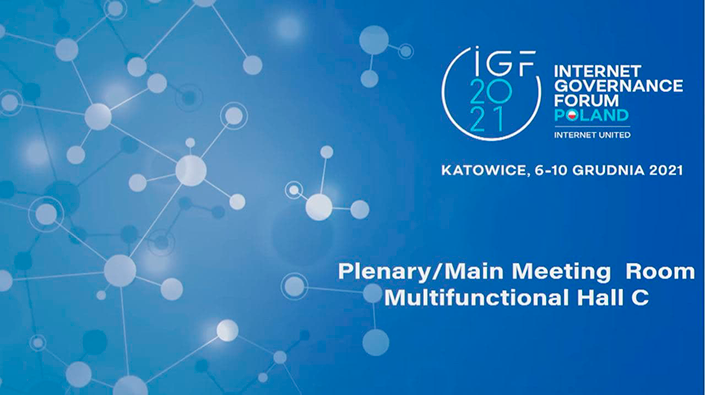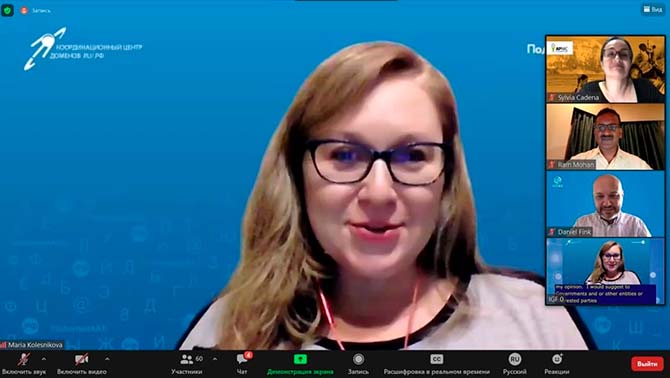
The Main Session on Meaningful Access & Connectivity, “How Can We Achieve a Multilingual Internet?” took place on December 8 as part of the 16th Internet Governance Forum (IGF 2021). The participants discussed the key concept that underpins meaningful universal connectivity – users’ ability to engage online in their own language. This subject is at the top of the agenda at internet governance forums at various levels; those in the Main Session explored the role of local content development and the universal acceptance of domain names as key drivers for a multilingual internet. They tried to answer the questions: what is a multilingual internet?; in what ways is the internet multilingual or not multilingual now?; what barriers are there to achieving a multilingual internet; and, are there examples of policies that have overcome those barriers? Finally, they proposed recommendations on the next steps towards achieving a multilingual internet.
Maria Kolesnikova, Chief Analyst at the Coordination Center for TLD .RU/.РФ, attended the session. She spoke at length about how the Russian government is helping promote Russian-language content and domains in their native language. As an example, she told the story of the first Cyrillic top-level domain, .РФ. She said that in 2010, the President of Russia and the Russian Government supported the launch of the first Cyrillic-script ccTLD, .РФ. At present, government agencies are using Cyrillic domains for their online projects and publishing their updates on official websites in Russian.

However, connectivity remains a cornerstone here. Internet penetration is about 85 percent in Russia, which means about 124 million internet users. Internet access is provided by about 3,000 operators, and the quality of access in Russia has improved significantly in recent years. The government continues to promote quality and accessibility: there are several national digital economy programs in place aimed at connecting socially significant facilities throughout the country. The government has also proposed an initiative to provide free access to socially significant resources.
Maria Kolesnikova also talked about the Coordination Center’s activities for the promotion of IDNs and the implementation of Universal Acceptance. She presented the Поддерживаю.РФ project for developers, system administrators and DevOps engineers, which helps ensure that all software products work correctly with Cyrillic domains and email addresses. The Поддерживаю.РФ website contains all available materials, such as standards, best practices, test results, useful tools and guidelines for ensuring compliance with UA requirements in Russian.
This year, two major Russian tech companies, the developer of the popular content management system, 1C-Bitrix, and the CommuniGate Pro mail platform, have updated their apps to support Cyrillic domains and emails. “We certainly continue to engage with other Russian tech companies such as Yandex and Mail.Ru, as well as with hosting providers, to motivate them to provide appropriate email services for Cyrillic IDNs,” the speaker continued.
She also noted that, if government officials and other stakeholders use more IDNs and EAI addresses themselves, they will be able to better understand the problems of users who want to engage online in their native language.
“Governments can update their software procurement policies to include requirements to support universal acceptance. In this way, they can motivate developers to implement IDN support in their products,” Maria Kolesnikova added.
The question of universal access was raised at other sessions of IGF 2021 as well. In particular, another Main Session showcased the ongoing work of the Policy Network on Meaningful Access (PNMA) experts. To ensure affordable and meaningful connectivity that will help improve people’s lives at the local level, strengthen the national economy and, more generally, achieve UN Sustainable Development Goals (SDGs), the experts suggest addressing this issue in a comprehensive manner. While access to infrastructure is critical, it can only unleash its positive potential by becoming inclusive, meaningful, sustainable, affordable and linked to the development of human potential. The PNMA brings together best practices from participants from all interested stakeholder groups.
IGF 2021 is ongoing; follow our updates.



